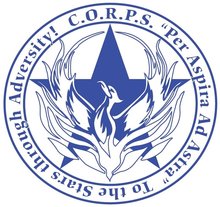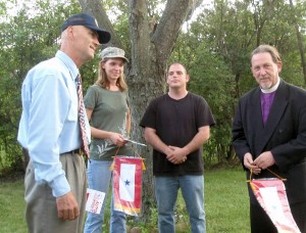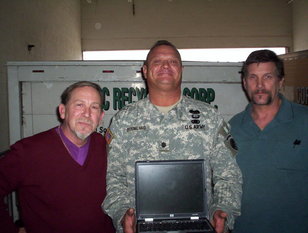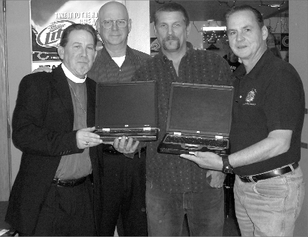C.O.R.P.S. - Chaplains Organized Response to PTSD-affected Service Personnel

Founded in 2008, CORPS has provided troops, their families, and service organizations that support them with collaboration in a number of concrete and non-concrete areas of assistance. Our primary and founding mission is to bring light into the darkness of PTSD that soldiers may experience. CORPS' chaplain base are clinically trained pastoral specialists who have begun to refer to certain post traumatic stress as 'Post Combat Stress Injury,' a term more specific to soldiers' conditions, and especially symptom origination. We feel that this distinguishing label is justified in its exclusivity, and promotes a desirable and positive therapeutic self esteem. CORPS has as its logo the Phoenix Rising against the background of a Blue Star, which is central to our organizational history and the motto: "Per Aspira Ad Astra" (i.e. "To the Stars through Adversity").
The Spiritual Impact of War
By C.O.R.P.S. founder +Robert M. Cokinis, CSM, Ep.Gn.
The greatest man made catastrophe is War, which is really and only a mass butchering of ourselves (i.e., kindred humanity) for an imagined noble purpose. In sustained conflicts we adapt to the horrors. The permanence with which the pain is assimilated is as subtle as catching a virus. External injuries are more easily comprehended and treated, depending on the severity of injury and the capacity to repair. Clean the wound, bandage it, and you’re OK to go. Not so fast or so easy when it comes to our minds and hearts, or our spirits for that matter, although that’s exactly what we humans have been conditioned to believe. We have also been conditioned that what is not visibly damaged is not so damaged, that our minds or our spirits are only as vulnerable and susceptible as we admit or allow them to be, and that we can and should “suck it up”, “take it like a man”, “get over it”, “move on”. But if, once the battle is over, your limb were hanging by a sinew, and you were losing massive quantities of blood and were sure to die soon, would you “get over it and move on”? These days, no wound can be properly treated and dressed without carefully inspecting the damaged area, and no surgery can be commenced without an X-ray or exploratory view by a doctor or group of doctors. So it is with mind and spirit. While both are non-visible to sight, their respective operating functions and normal processes can be observed and can be treated, just as the virus that displays outward symptoms to a medical professional but is not seen with a microscope can be treated. As a clergy-person, I am most interested in the treatment of spirit and soul, which we view equally as a science, as equally a science, and which are also vulnerable to distress and dis-ease. Religious vehicles, primarily rites, ceremonies, prayers, meditations, sacred readings, poetry, etc. can ease, comfort, and repair such sufferings, if not eliminate them. In ancient times the healers knew of healing both body and soul. In our twentieth century, psychiatrist Carl Jung showed that the keys to psychic and spiritual health reside deep in the consciousness, below our mental and spiritual basements; in the crawl spaces and even the foundations of our beings lie the clues. The symbols we respect and worship, even the harmonies and beauty of nature, were not put here merely for enjoyment and recreation, but also for healing or medication for body and soul. As a seasoned psychiatric crisis professional and a domestic violence professional, I’ve had more than casual clinical training in P.T.S.D. In earlier training days I had trained in critical incident debriefing (CID) offered to crisis professionals long before the DSM catalogued post traumatic stress as a disorder. Some vets I’ve met and spoken to about PTSD have admitted that they have it, and some shrug it off as the effects of war that they knew they would face as they witnessed their brother soldiers being irreparably maimed or killed, often in their helpless sights. Often these vets speak about concentrating on getting home and going to work to support families, which is what they knew they had to do. Many of these vets have nothing really good to say about seeking treatment. But ignoring PTSD it does not make it go away. “Out of sight, out of mind” may delay the consequences, but they come around, and often enough collateral damage becomes the first of the measurable and observable effects. Ignoring it only delays the consequences. In the case of vets who served in Vietnam, suicides are being reported amongst the so-called baby-boomers, who, upon their retirement from a lengthy and productive career or work history, are finding in the open time that they drift back into flashbacks and troubling memories. Ignoring it may delay the consequences, but will not make them go away. Our work is to raise awareness, educate, salvage and bring back to reintegrative health the soul and spirit; to help those who have fought for us and our noble democratic values. We can and must put an end to soldier-cide and revive the American society’s spirit of pride in defense of justice and humanity. |
Grantham University Teams Up with C.O.R.P.S. and Donates Fifty Blue Star Flags To Military Personnel and Families
|
C.O.R.P.S. on Facebook


